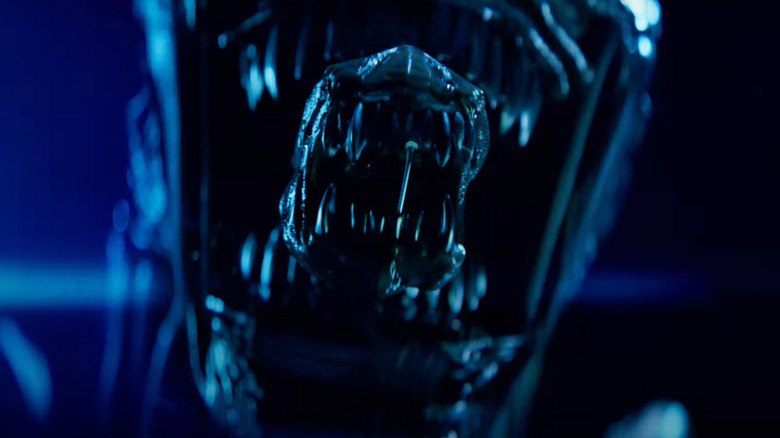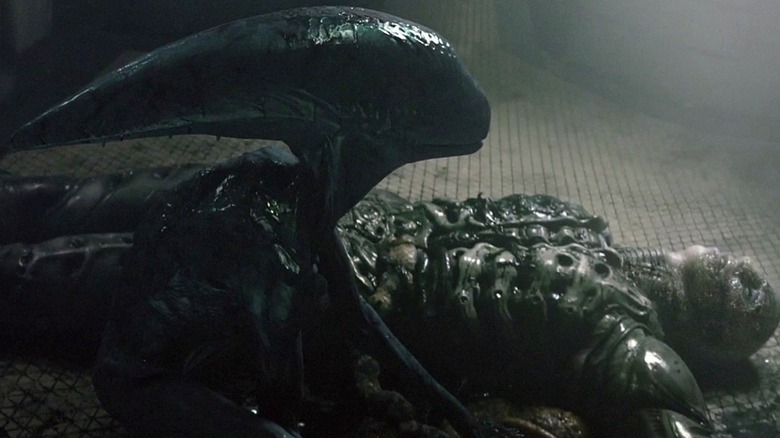The New Alien TV Series Presents A Big Problem For The Franchise Timeline
It has been a long time coming, but Noah Hawley's "Alien" TV show is finally coming our way in 2025 after first being announced in December 2020. Officially titled "Alien: Earth," the show is going to, at long last, bring the dreaded Xenomorphs to face humanity on our own turf. Yes, this already happened in the "Alien vs. Predator" movies, but those are not technically part of the official canon. That said, this show being part of the official canon does raise some interesting questions about its place in the overall franchise timeline.
Recently, a very brief teaser for "Alien: Earth" was released online, one that also came with a synopsis for the show. It explains that when "a mysterious space vessel crash-lands on Earth, a young woman (Sydney Chandler) and a ragtag group of tactical soldiers make a fateful discovery that puts them face-to-face with the planet's greatest threat." The footage also includes a Xenomorph, making it explicitly clear that this isn't going to be some unknown alien threat — the deadly, perfect organisms with acid for blood are coming to Earth. That's an interesting concept, but it's a matter of when this is all happening that makes things tricky.
Back in February 2022, FX Networks head John Landgraf revealed some details about the "Alien" show, saying that it takes place roughly 70 years from now on Earth. That means, roughly speaking, it's taking place around 2094. Interestingly enough, that's almost exactly when Ridley Scott's 2012 prequel movie "Prometheus" takes place, as the film is set in 2093. That's where things get a little complicated.
As we saw in that film, an alien race known as the Engineers was responsible for seeding humanity on Earth. They also created the alien spore that creates Xenomorphs as we know them. However, Xenomorphs don't actually appear in "Prometheus." At the very end, a Xenomorph-like creature known as the Deacon shows up, but that's as close as we get. And therein lies the potential problem.
Alien: Earth has to walk a fine line to make sense
It's possible that Mr. Landgraf wasn't exactly on the money with his 70-year comments in 2022. Looking elsewhere on the timeline, 2017's "Alien: Covenant" takes place in the year 2104, roughly 80 years from now. That film sees the emergence of a proper Xenomorph as we know it. So if the show takes place closer to those events, maybe it would make more sense?
That official synopsis also doesn't explicitly state that Xenomorphs are on the crashed ship — it just says the humans encounter "the planet's greatest threat." Maybe some Engineers make their way back to Earth, bringing some of the alien spore with them? In such a scenario, all of the genetic material to make a Xenomorph would be on hand. That would certainly provide an interesting wrinkle. It would mean that Michael Fassbender's David would have created the creatures lightyears away from Earth, while they were being created through other means on our planet as well.
This is all speculative, to be certain, but it's more to get at the idea that these are questions that the show will likely need to address in order for it to make sense. After all, "Alien: Romulus" didn't ignore Ridley Scott's prequels, so it's unlikely that Hawley's show will, either. It's just a matter of how Hawley chooses to address them, and how the show fits in with what already exists.
I spoke more about this with /Film editor Ben Pearson on today's episode of the /Film Daily podcast, which you can listen to below:
You can subscribe to /Film Daily on Apple Podcasts, Overcast, Spotify, or wherever you get your podcasts, and send your feedback, questions, comments, concerns, and mailbag topics to us at bpearson@slashfilm.com. Please leave your name and general geographic location in case we mention your e-mail on the air.
"Alien: Earth" is set to arrive on Hulu in 2025.

